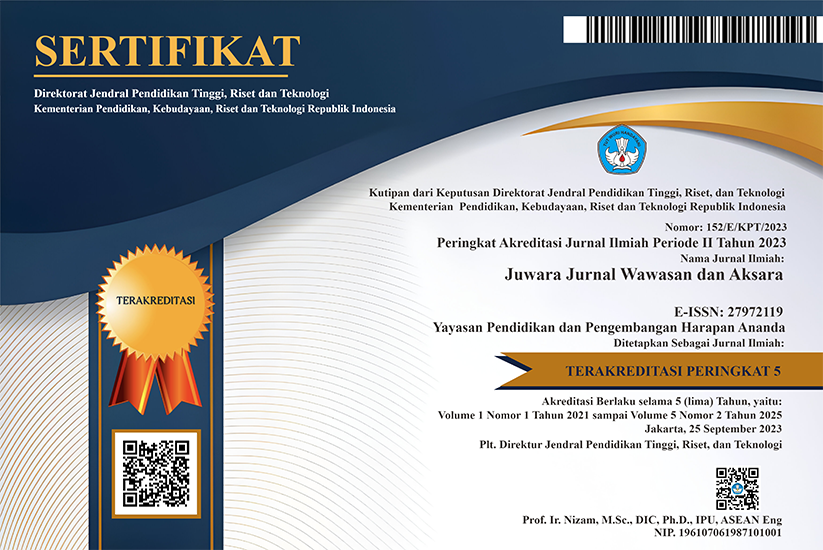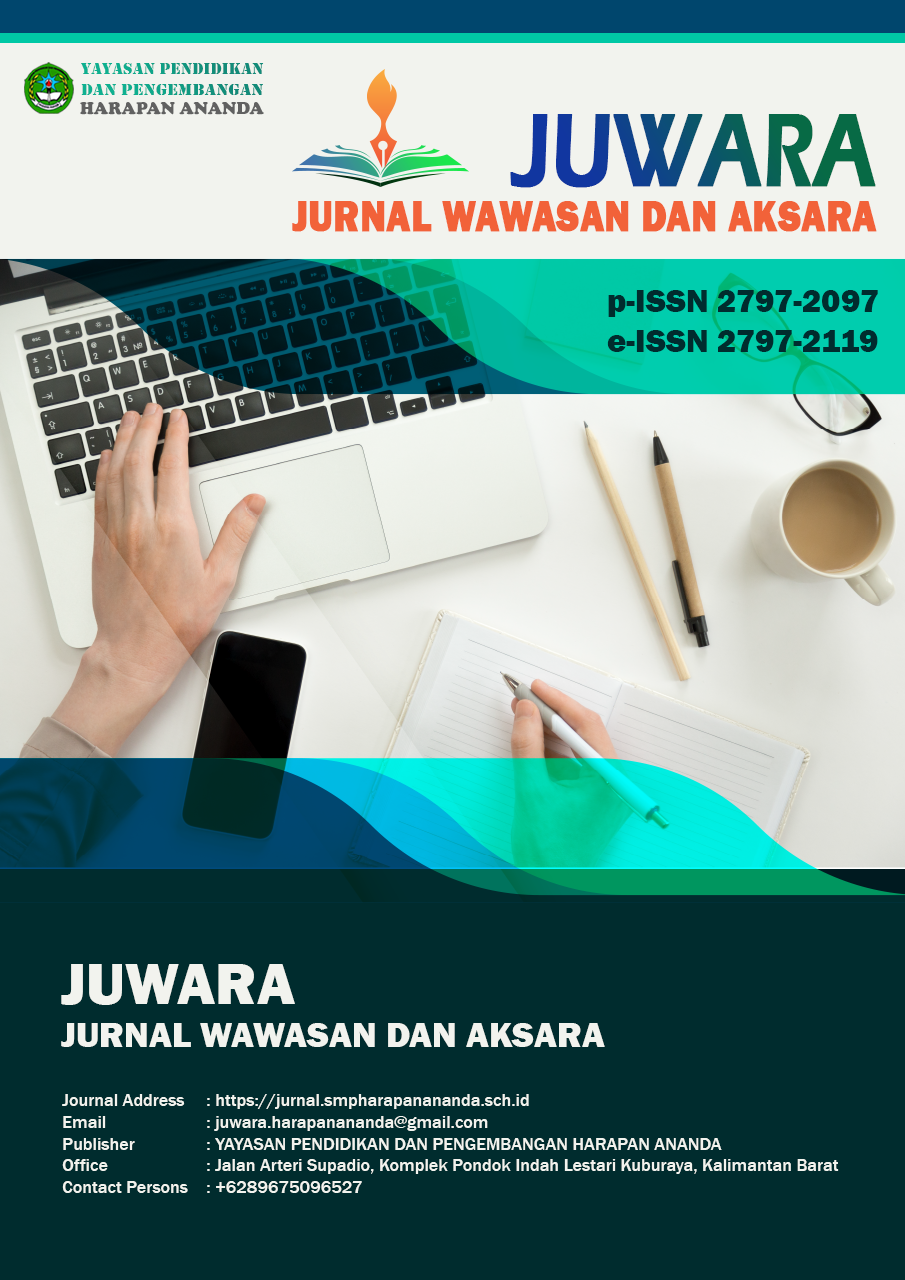Reformulation of School Management Strategies in Improving Teachers Digital Competence: A Case Study
DOI:
https://doi.org/10.58740/juwara.v5i1.504Keywords:
digital competency, leadership, school managementAbstract
This research aims to explore and analyze the reformulation of school management strategies in improving the digital competence of teachers in private high schools. Digital competence is an urgent need in the era of educational transformation, especially for teachers as the main actors in the learning process. This study uses a qualitative approach with a case study design on two private high schools located in the Magetan area. Data were collected through in-depth interviews, participatory observations, and documentation studies, analyzed using the Miles and Huberman model which included data reduction, data presentation, and conclusions drawn. The results of the study show that private schools that implement HR strategies in a planned and contextual manner ranging from digital skill-based teacher recruitment, continuous training, digital platform-based performance evaluation, to providing digital innovation-based incentives are more successful in improving teacher competence. The transformational leadership of the principal is a key factor in the success of the strategy. These findings confirm the importance of a comprehensive school management reformulation to support the successful digital transformation of education in private secondary schools. This research provides theoretical and practical implications for school and foundation management in designing digital needs-based human resource strategies.
References
Beck, J. S., Hinton, K., Butler, B. M., & Wiens, P. D. (2025). Open to All: Administrators’ and Teachers’ Perceptions of Issues of Equity and Diversity in Teacher Leadership. Urban Education, 60(8), 2195–2222. https://doi.org/10.1177/00420859231202998
de Oliveira, P. H., Catussi Paschoalotto, M. A., Santos, F. C. A., de Sousa, T. B., & Nagano, M. S. (2023). Systematic literature review on organisational culture and strategic management in the public sector and school management. School Leadership & Management, 43(3), 210–237. https://doi.org/10.1080/13632434.2023.2176483
Dewi, F., Maiysaroh, M., & Ubaidillah, A. F. (2024). School Principals’ Strategies in Improving Primary School Teachers Performance: Literature Review Study. International Journal of Business, Law, and Education, 5(2), 1537–1543. https://doi.org/10.56442/ijble.v5i2.624
Elrehail, H., Harazneh, I., Abuhjeeleh, M., Alzghoul, A., Alnajdawi, S., & Ibrahim, H. M. H. (2020). Employee satisfaction, human resource management practices and competitive advantage. European Journal of Management and Business Economics, 29(2), 125–149. https://doi.org/10.1108/EJMBE-01-2019-0001
Hasanah, U., Rahayu, S., & Anggraini, A. I. (2022). Improving Prospective Basic Education Teachers’ Capabilities on Digital Literacy: A Systematic Literature Review. Al Ibtida: Jurnal Pendidikan Guru MI, 9(2), 417. https://doi.org/10.24235/al.ibtida.snj.v9i2.10339
Kardina Engelina Siregar. (2024). Increasing Digital Literacy In Education: Analysis Of Challenges And Opportunities Through Literature Study. International Journal of Multilingual Education and Applied Linguistics, 1(2), 10–25. https://doi.org/10.61132/ijmeal.v1i2.18
Kormos, E. (2024). Bridging the Gap: Exploring Urban High-Needs Teachers’ Perceptions of Online Teaching Readiness and the Digital Divide. Education and Urban Society, 56(9), 1094–1117. https://doi.org/10.1177/00131245241261088
Lee, V. J., Tecce DeCarlo, M. J., Grant, A., & Neuman, D. (2021). A Collaborative I-LEARN Project With Kindergarten and Second-Grade Urban Teachers and Students at a University-Assisted School. Urban Education, 56(1), 123–153. https://doi.org/10.1177/0042085916677344
Li, M., & Yu, Z. (2022). Teachers’ Satisfaction, Role, and Digital Literacy during the COVID-19 Pandemic. Sustainability, 14(3), 1121. https://doi.org/10.3390/su14031121
Llamazares de Prado, J. E., & Arias Gago, A. R. (2023). Technology and Education as Elements in Museum Cultural Inclusion. Education and Urban Society, 55(2), 238–258. https://doi.org/10.1177/00131245211004576
Lu, Y., Zhang, M. M., Yang, M. M., & Wang, Y. (2023). Sustainable human resource management practices, employee resilience, and employee outcomes: Toward common good values. Human Resource Management, 62(3), 331–353. https://doi.org/10.1002/hrm.22153
Martin, E. M., & Benedetti, C. (2025). Teacher Retention in High-Poverty Urban Schools: The Role of Empowerment, Leadership, and Collaboration. Education and Urban Society, 57(5), 423–443. https://doi.org/10.1177/00131245251318318
McKinney, S. E., Ford, D. J., & Tomovic, C. (2024). The Impact of Star Teacher Characteristics on Teacher Selection and Retention in Urban High Poverty Schools: A Qualitative Analysis. Education and Urban Society, 56(4), 422–445. https://doi.org/10.1177/00131245221139451
Meijerink, J., Boons, M., Keegan, A., & Marler, J. (2021). Algorithmic human resource management: Synthesizing developments and cross-disciplinary insights on digital HRM. The International Journal of Human Resource Management, 32(12), 2545–2562. https://doi.org/10.1080/09585192.2021.1925326
Nguyen, L. A. T., & Habók, A. (2024). Tools for assessing teacher digital literacy: a review. Journal of Computers in Education, 11(1), 305–346. https://doi.org/10.1007/s40692-022-00257-5
Purmayanti, D. (2022). The Challenges of Implementing Digital Literacy in Teaching and Learning Activities for EFL Learners in Indonesia. BATARA DIDI: English Language Journal, 1(2), 101–110. https://doi.org/10.56209/badi.v1i2.38
Rêgo, B. S., Jayantilal, S., Ferreira, J. J., & Carayannis, E. G. (2022). Digital Transformation and Strategic Management: a Systematic Review of the Literature. Journal of the Knowledge Economy, 13(4), 3195–3222. https://doi.org/10.1007/s13132-021-00853-3
Tanjung, B. N. (2020). Human Resources (HR) In Education Management. Budapest International Research and Critics in Linguistics and Education (BirLE) Journal, 3(2), 1240–1249. https://doi.org/10.33258/birle.v3i2.1056
Tran, H. (2022). Revolutionizing School HR Strategies and Practices to Reflect Talent Centered Education Leadership. Leadership and Policy in Schools, 21(2), 238–252. https://doi.org/10.1080/15700763.2020.1757725
Wiens, P. D., Calkins, L., & Skousen, J. D. (2025). Examining Teacher Leadership in the United States: How do BIPOC Teachers and White Teachers in Urban Environments Experience Shared Leadership? Urban Education, 60(8), 2223–2248. https://doi.org/10.1177/00420859231198171
Wohlfart, O., & Wagner, I. (2023). Teachers’ role in digitalizing education: an umbrella review. Educational Technology Research and Development, 71(2), 339–365. https://doi.org/10.1007/s11423-022-10166-0
Wronowski, M. L., VanGronigen, B. A., Henry, W. L. C., & Olive, J. L. (2024). “We’ve Been Forgotten”: First-Hand Perspectives on Teacher Leaders and Teacher Leadership in Urban Schools. Education and Urban Society, 56(5), 541–563. https://doi.org/10.1177/00131245221150915
Yong, J. Y., Yusliza, M., Ramayah, T., Chiappetta Jabbour, C. J., Sehnem, S., & Mani, V. (2020). Pathways towards sustainability in manufacturing organizations: Empirical evidence on the role of green human resource management. Business Strategy and the Environment, 29(1), 212–228. https://doi.org/10.1002/bse.2359
Zheng, Y., Shen, J., Johnson, M. R., Krenn, H. Y., & Carter, K. (2024). School Effectiveness Factors and Student Achievement: A Longitudinal Study in an Urban School District. Education and Urban Society, 56(8), 931–950. https://doi.org/10.1177/00131245241230086
Downloads
Published
How to Cite
Issue
Section
License
Copyright (c) 2025 Suparno, Eko Pujianto

This work is licensed under a Creative Commons Attribution-NonCommercial 4.0 International License.
JUWARA: Jurnal Wawasan dan Aksara provides open access to anyone so that the information and findings in these articles are useful for everyone. This journal's article content can be accessed and downloaded for free, following the creative commons license used.




















